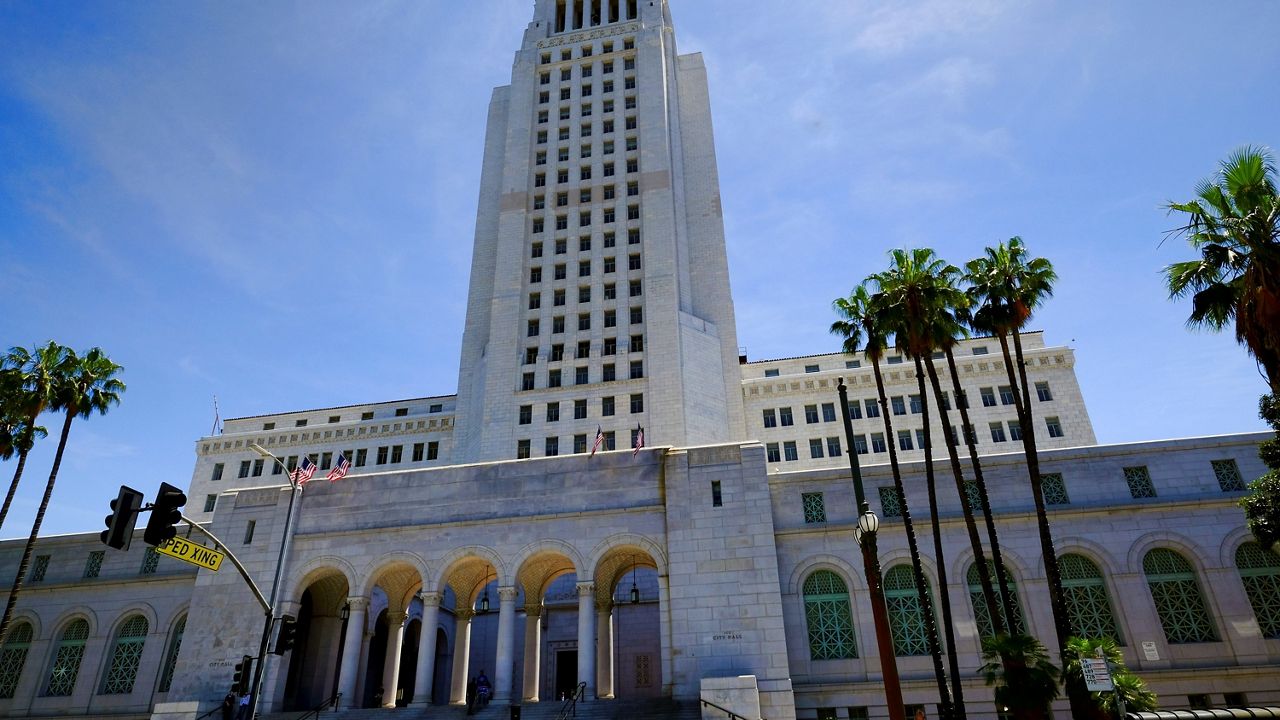LOS ANGELES (CNS) — The Los Angeles City Council Wednesday approved an ordinance requiring COVID-19 vaccinations for all city employees except for those who have medical or religious exemptions.
What You Need To Know
- Under the ordinance, which will next go to Garcetti for approval, non- exempt employees must receive their first dose of the Moderna or Pfizer two- dose vaccine no later than Sept. 7
- Their second dose no later than Oct. 5
- Employees who choose to receive the single-dose Johnson & Johnson vaccine would have to be inoculated by Oct. 5
- The ordinance does not include finalized consequences for employees that do not get vaccinated and aren't eligible for an exemption
"When we originally moved to require city employees to be vaccinated, we were one of the first cities in the country to do so. Now multiple states, including California, and other large cities across the country have all began to require their public servants be vaccinated," said Council President Nury Martinez." This is not radical, this is just common sense."
Mayor Eric Garcetti and Martinez announced on July 27 that city employees would be required to show proof of COVID-19 vaccination or a weekly negative COVID-19 test, but under the ordinance, "only those with a medical or religious exemption and who are required to regularly report to a work location are eligible for weekly testing."
"How can we ask Angelenos to be vaccinated if we are not doing it ourselves? We need to set the strong example for our communities. The vaccines are available they're effective, and they're keeping people out of the hospital and off ventilators," Martinez said.
The ordinance will next go to Garcetti for final approval.
"The Delta variant continues to spread, and it is more important than ever that people get vaccinated as soon as they can. As the council president and I said last month, this requirement will help protect the health and safety of those who keep our city running and the Angelenos who rely on the services they provide every day," Garcetti said in a statement provided to City News Service on Wednesday afternoon.
Under the ordinance, which will next go to Garcetti for approval, non- exempt employees must receive their first dose of the Moderna or Pfizer two- dose vaccine no later than Sept. 7, and their second dose no later than Oct. 5. Employees who choose to receive the single-dose Johnson & Johnson vaccine would have to be inoculated by Oct. 5.
Exemption requests will be evaluated on a case-by-case basis and be due by Sept. 7. People will be qualified for an exemption if they have a medical condition or sincerely held religious beliefs, practices or observances that prevent them from receiving the vaccine.
"Let's let science, data and a reasoned approach prevail because we want you to live, we want your family to be well, we want the city to be healthy," Councilman Mitch O'Farrell said before the vote.
Councilman Mark Ridley-Thomas, who was an early leader in the effort to require city employees to get vaccinated, said, "While the coronavirus continues to mutate in unforeseen and increasingly disruptive ways — what's different about this surge from previous ones is that we have the tools to prevent the rise in cases from shutting down our businesses, our schools, and our houses of worship as we saw last year. But, plain and simple, we are hamstrung from moving beyond this pandemic based on the refusal of some to get their shot."
The ordinance does not include finalized consequences for employees that do not get vaccinated and aren't eligible for an exemption, but Vivienne Swanigan of the City Attorney's Office told council members that the consequences are being hashed out with labor unions.
Once the city finishes bargaining with unions, a consequence laid out in the ordinance is that those who are unvaccinated, partially vaccinated or have not reported their vaccination status would be "ineligible to promote or transfer" until they are fully vaccinated.
Councilman Paul Koretz theorized Wednesday that "a fair amount" of city employees aren't vaccinated because they think the fact that they've contracted COVID-19 already provides immunity, noting "the fact that you've had COVID-19 is less protection than even one shot, and one shot is not enough to protect you. You need to be fully vaccinated."
Opponents and supporters of the ordinance called into the City Council meeting ahead of the vote.
Some opposed the vaccination requirement for city employees, saying that it is up to the individual to decide and positing that vaccines aren't that effective because there are breakthrough cases and don't yet have full approval from the U.S. Food and Drug Administration, which so far has approved the vaccines for emergency use.
Councilman Gil Cedillo combated arguments about personal rights to say that people have a choice to work for the city or not work for the city, but if they choose to work for the city they have to follow the rules of the workplace.
"You can't come to work drunk, you can't smoke in your office, you have a right to do both of those things, but you can't do that here at work," Cedillo said.
Councilmen Bob Blumenfield and Koretz responded to people arguing breakthrough cases are a reason not to get vaccinated by saying that innocolated people are far less likely to get the virus and have extra protection to fight it if they do contact COVID-19.
Koretz cited the case of a man who was vaccinated, contracted the virus and was hospitalized, but survived.
"Doctors told him, `you got such a significant hit of COVID-19, if you were not vaccinated, you would be dead.' So who wants to insist on remaining in that category?" Koretz said.
Once finalized, the ordinance will become effective immediately upon publication, as it includes an "urgency clause" that deems it necessary "for the immediate protection of the public peace, health and safety."



